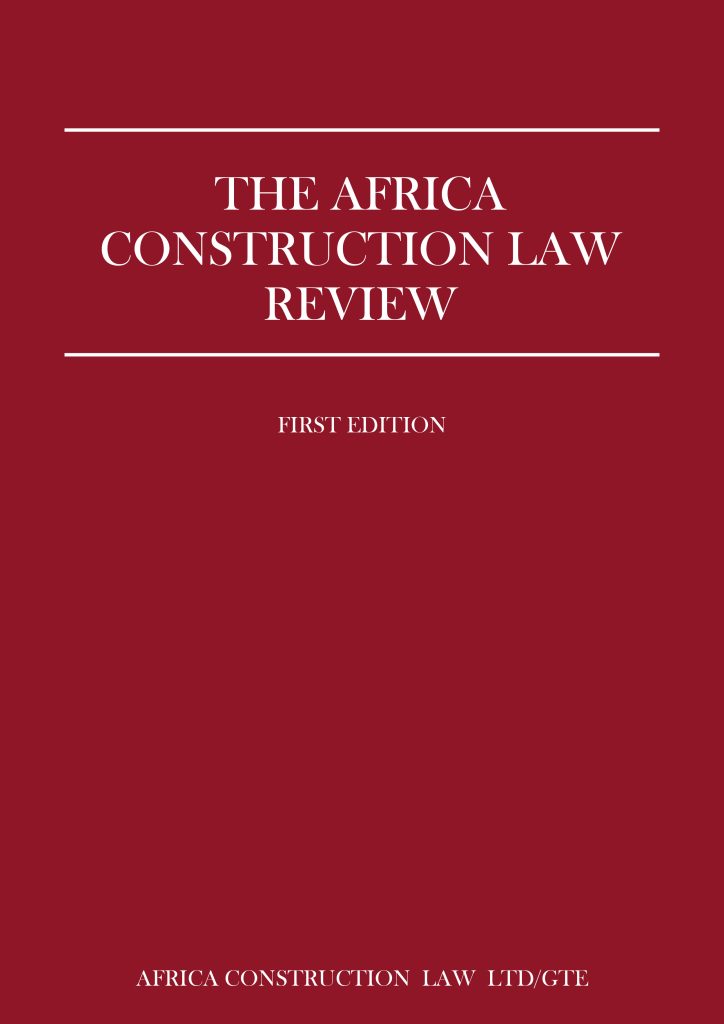- +2348103002289, +447535362138
- info@africaconstructionlaw.org

Authors:
Cindy Oraro, Sheila Nyakundi-Marilu, Anna Kandu, Eva Mukami, (Oraro & Company Advocates, Nairobi Kenya)
Guest Editors:
James Doe (Herbert Smith Freehills), Sadaff Habib (Equanimity Arbitration), Louwné Deysel (Allen & Overy), Yolanda Ngozi Walker
Provide an overview of the construction industry in your country bearing in mind the (i) contribution to GDP and/or employment; (ii) major sector of activities; (iii) whether it is dominated by foreign or local firms; (iv) existence of local manufacturing; and (v) any local requirement.

The construction industry in Kenya, as is the case globally, is an important contributor and determinant of socio-economic development. According to the Kenya National Bureau of Statistics, the construction industry’s growth in 2019 was 6.4% compared to a 6.9% growth in 2018. In 2019, Kenya’s construction industry contributed 7% to the GDP, making it a significant sector in the country. In terms of employment, a survey done by the National Construction Authority (“NCA”) indicates that in 2014, the industry employed 511,676 workers as Skilled, Semi-skilled and Unskilled Artisans.
The construction industry’s major activities include heavy and civil engineering, which account for more than half of construction projects in the country. The Government of Kenya sponsors 60% of construction projects in the country. This is expected in a developing country and is a positive sign, demonstrating the government’s commitment to investment in the country’s infrastructure. Other significant activities include general construction i.e. residential, commercial and industrial, which generally account for the other half of activities in the construction industry.
The NCA, which is tasked with the registration of contractors in Kenya, noted that 50% of the 18, 000 contractors in its Register of Contractors as at 2015 were local contractors. This means that half the market is dominated by foreign contractors. In Kenya’s Draft Construction Industry Policy, 2018, it is noted that over 80% of Kenyan contractors are small and medium enterprises (“SMEs”), which only qualifies them for smaller construction projects. Most local contractors lack the financing, manpower and equipment to take up mechanical engineering projects, which creates a gap for the qualifying foreign contractors to take up these projects.
The manufacturing sector, as it relates to construction materials, is very vibrant and able to satisfy the demand for construction of materials in the country. The materials manufactured locally include cement, glass, steel, plastic and ceramic ware. The challenge is that local manufacturers are unable to provide prefabricated products, which if provided, would be an important leap as it would make the products required in construction much cheaper. The NCA reports that 89% of contractors use locally available
construction materials while 8% of them mostly use imported materials. The remainder use both locally
available and imported materials.
The Kenyan legal system has laws and regulations specific to the construction industry. These include the National Construction Authority Act, No. 41 of 2011 (“NCAA”), which provides for the accreditation, registration and regulation of contractors and construction projects and the Physical and Land Use Planning Act, No. 13 of 2019, which governs planning, use, regulation and development of land. With respect to local content requirements, the National Construction Authority Regulations, 2014, (“NCA Regulations”) provide that a foreign firm is required to make an application to the NCA before undertaking certain catego- ries of works. The application must be accompanied by an undertaking in writing that the foreign contrac- tor shall subcontract or enter into a joint venture with a local person or firm for not less than 30% of the value of the contract work for which temporary registration is sought and to transfer technical skills which are not available locally to a local person or firm in such manner as the NCA may determine from time to time. The professionals in the construction industry are governed by sector specific legislations. For example, the Engineers Act, 2011 provides for the accreditation, registration and regulation of engineers while the Architects and Quantity Surveyors Act, Chapter 525, Laws of Kenya governs the practice of archi- tects and quantity surveyors. Various laws relating to the environment, health and safety affect the construction industry and its key play- ers. These include the Environmental Management and Coordination Act, No. 8 of 1999, which requires certain construction projects to be approved by the National Environment Management Authority and for construction activities to be conducted in a manner that does not pose a risk to the environment and the Occupational Safety and Health Act, No. 15 of 2007, which requires contractors to ensure the safety of workers working on construction sites.




GUEST EDITORS:
James Doe (Herbert Smith Freehills),
Sadaff Habib (Equanimity Arbitration),
Louwné Deysel (Allen & Overy),
Yolanda Ngozi Walker (DWF Law LLP)




The global platform for construction law and practice in Africa.
1 Murtala Muhammed Drive, Ikoyi – Lagos